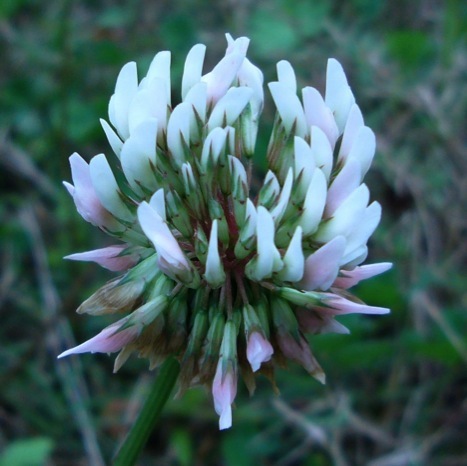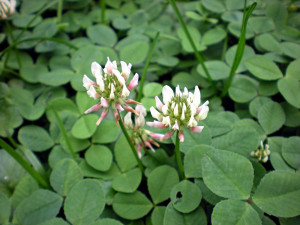Clover, Available Around The World
Hay may be for horses, but clover is for people…well…. almost.
I was forever nibbling on clover blossoms when I was a kid. I suspect I did that because my mother did that. She did that because her mother did. I don’t know how far that habit stretched back, so I don’t know if the consumption it is by taste or by example.
One of the more surprising sides of clover is that it’s in the pea family, and its blossom is actually a bunch of little pea-like blossoms, called ”wings and keels.” Clover is also a native of Europe and western Asia but has been used as a pasture crop worldwide. And while there are few pasture in the Arctic, clover grows from the top of the earth to the bottom and all around, nearly every location on the rotation. Though well-known as totally edible, from blossom to root, it is not choice “eating wild.” Some call it a survival food, and perhaps rightly so for only the blossoms are truly pleasant to human tastes. The leaves are an acquired or tolerated taste.
In reference to the blossoms, don’t select brown ones. You want young and fresh whether white or pink or red though white clover is the better tasting of them all. Besides a tea you can pan roast the blossoms until nice and crispy. The leaves are another matter. Young ones are digestible raw in small amounts, half a cup or so. Older leaves should be cooked, but I think you’d have to be hungry to eat them. It is a survival or famine food. See Sweet Clover, or Melilotus.
While it may not be that good in taste, clover can be good for you. It is high in protein, has beta carotene, vitamin C, most of the B vitamins, biotin, choline, inositol, and bioflavonoids. Clover does come with three words of warning, however: One is that quite a few people are allergic to it and don’t know it, so go easy at first until you know one way or the other. Secondly, NEVER …. did you see that word? NEVER ferment and eat any part of it. You want your clover either completely fresh or completely dried, Never in between. Lastly clover in warm climates can produce small amounts of cyanide. Here is the site address: http://www.sciencedaily.com/releases/2007/10/071001151308.htm
The botanical name for white clover is Trifolium repens. (Trifolium tri-FOE-lee-um) means three leaves, and repens (REE-penz) means crawling but not rooting. Most of the plant crawls along, only the blossoms stand up. Now, one parting measure of how humanity is getting along with nature: Clover is now legally discouraged in lawns and the like because it attracts bees and people might get stung. Frankly, I think we need less lawyers than less clover.
Green Deane’s “Itemized” Plant Profile
IDENTIFICATION: An evergreen perennial growing to half a foot, famous for its three leaves, blossom can be white, pink and red.
TIME OF YEAR: Seasonal usually summer into fall
ENVIRONMENT: Likes sunny areas and moist soil. Usually found in lawns
METHOD OF PREPARATION: Numerous: Leaves – raw or cooked as a potherb, young leaves before flowering suitable in salads or soups, can be cooked and used like spinach. Dried seed pods and flowers ground into powder used as a flour, young flowers in salads. Cooked root edible. Dried flowers best known for making tea. Dried leaves can have a hint of vanilla aroma.




Intelligence and simpiclity – easy to understand how you think.
Sooooooooooo THAT’S why I’ve been called simple…
I know you can sprout clover to eat, but can you sprout the white….. Or just the red?
White and red, yes. Becareful with Sweet, however.
So clover in warm climates has been known to produce cyanide compounds…but the term “warm” is kind of vague. I live in TN. We’ve got four distinct seasons (although kind of blurry these passed few years). Would my area be considered a warm climate? Also, climate is the factor and not temperature, right? If I was foraging for whatever clover I could find around late Fall or Winter, would it still be the same risk as foraging in Spring?
Yes, you are warm but only for a few months.
What about the yellow flowered ones? There are 2 kinds that grow around my place, FL panhandle. I grew up eating the bushier one with lucky charm looking clover leaf and single yellow pea or peanut type flower. The other has a more seperated leaf and long stem habit with many small flowers making a blossom. I haven’t tried the 2nd yet. Are these actually clover or just close cousins?
Is your yellow “clover” very small or quite tall? If small I would leave it alone, if tall it could a variation of Sweet Clover.
Perhaps Diana is referring to wood sorrel?
That would be my guess. Diana, wood sorrel looks similar to clover, but the leaves are heart-shaped and the flower is more of a pea-blossom shape, not ball-like flower of a clover.
I’m sorry to disagree, but wood sorrel doesn’t have a pea like blossom at all. It’s more like a little trumpet shaped daisy with five evenly sized petals.I think what she has is birdsfoot trefoil which does have pea like blossoms in a clover like head.
That sounds more like birdsfoot trefoil, which is also a legume. I’m not sure if its edible though.It’s planted in pasture mixes and frequently spreads to grow along roadsides.
The answer is I don’t know because I don’t know what you are calling “normal” clover. With clover that is edible you have to limit yourself to about half a cup or you’ll throw up.
I don’t know how it affects humans as a blood thinner, but a diet high in clover can make some horses severely anemic. It has blood thinning qualities that can make breeds prone to bleeding (i.e. thoroughbreds) very anemic.
Only fermented red clover has a coumarin derivative, ie rat poison but also like pharmaceutical Coumadin
I have used white clover in green smoothies and have found it delicious! I mixed it with fresh mint and fruit such as apples, pears and/or peaches. Tastes very “green” and fresh, not bitter at all.
Sounds delicious Susan… will definitely be trying white clover in green smoothie… It’s growing very plentiful where I live mid north coast Australia. Most people around me view it as a pesky weed and kills it either by mowing over it or spraying it but I allow mine to grow wild and if it needs a trim, sit down and trim it with clippers or pull out by hand – it’s a nice Zen practice. It’s so healthy and pretty – only just started blooming this week in masses of flowers. Only just discovered via this article that it is OK to eat so I’m gonna eat it, juice it, dry it and try some recipes.
Why must one never NEVER ferment white clover? I haven’t tried it, but now that I’ve done dandelion wine, I find myself looking at the lawn a little differently 🙂
Because you run the chance of creating the mold that causes Sweet Clover Disease which reduces your blood’s clotting ability.
Ah well, being that the case, I think the risk can be managed. There are plenty of wild plants that we eat that have small amounts of coumarins, but it would require really large amounts of them and sustained consumption in order for them to pose a real threat to humans. Not to mention, other wild plants (like lettuces) contain vitamin K, which is the antidote.
I think an experienced fermenter could reasonably safely lactoferment clover, or even flavour wine with it (why you’d want to do such a thing is an entirely different argument). Mold growths in such processes are undesirable and a sign that things have gone wrong, usually. In lactofermentation specifically, doing it completrly anaerobically makes this risk be essentially zero.
I believe it’s important to always know the reasons behind why things should or should not be done.
Hi Rachelle,
Could you please email me dandelion wine. I’ve just started using the tea from the weeds in my garden and LOVE IT.
As you could tell I’m new at this healthy non shop bought stuff, especially learning about edible common garden weeds. Love clover taste so YUMMY , sour and refreshing.
Thanks in advance.
Blessings from Bisa
Hi Rachelle,
Will you please email me your dandelion wine recipe too.
There are a lot of catchwords nowadays but i consider green parts of clover to be perfect “PREbiotics”. most people have now heard of PRObiotics which are of course the “non human” symbiotic bacteria type cellular organisms eating our food in the gut, but PREbiotics are foods that are specifically intended for these organisms. It is my opinion that non-toxic less digestible greens are a great way to promote healthy intestinal flora (not to mention the native microbes on the leaf ready to start decomposing the leaf in your gut or not). It is also my belief that by eating these foods you increase your ability to eat these foods and utilize their nutrients.
I’m from west TN. What months would be considered the “warm” months? I have a lot of clover in my yard and I would love to know when it is safe to eat. Thanks for the quick response!
Summer in your area is the warm month. Young and tender clover is good.
i have white and yellow flowering clover if im not reading your article all wrong the young,white-unbloomed flower is best for human consumption though only at measures of half a cup or less?(per- interval ) and that the young leaves are good for a tea?/ i also have a larger dark- green, well rounded- heart shaped, 3 leaf clover type plant with white squiggly like coloring across (side to side) the wider end of the leaves, all leaves have this coloring reminds me of a tiny hosta plant what are the edible property’s if any does this plant hold ? if i have not provided sufficient info. please educate me if you will thank you for your time and consideration
i love LOVE your videos and website! im learning about wild foraging and we have alot of red clover in my area. you mentioned (like another previous reader did) what temperature climate do you consider warm? i live on the south coast of oregon. me personally i dont think we qualify as warm… its a temperate climate but we do get our warm days but what we consider warm is like in the 70’s 🙂 anything over that and we melt! lol
In central West Virginia, there is a green that is eaten called “buffalo clover.” It doesn’t look like a clover at all. My old friend says it was picked so heavily during the depression that it is now quite rare. He gave me a plant, which I’ve put in my yard to see if I can get it going. has anyone done a photographic guide to edible plants with vernacular names? There are dozens around here that are commonly eaten but with names that don’t relate to any botanical names or guides.
My old Gray’s Manual of Botany calls Trifolium reflexum Buffalo Clover and T. stoloniferum Running Buffalo Clover.
Red clover is known among the herbalist crowd to help with menopause. So it has phytoestrodial and should not be used in pregnancy. Here’s the pregnancy hormones in a nutshell; progesterone is the precursor hormone to several sex hormones. It is also the stabilizing hormone for pregnancy. Estrogen among other things, raises quickly when it is time to deliver the baby. It is the delivering hormone among others. So if a lady increases her estrogen at the wrong time, unhappy things can happen.
There’s white clovers all over in our yard but I live in Ohio and the weather is speratic.How do I know when it’s okay to eat clover or if is okay at all?
I live in Ohio and the weather is rather sporadic.When is a safe time to eat clover or is it safe to eat here at all?
Partly off subject here, but to my way of thinking, if it’s wild and I see bees or other beneficial insects on it, I put some purposely in my yard to grow more of it. The idiots who think we need to get rid of all bugs are the same idiots killing off the honeybees that have been doing a lot of the pollinating for American farmers. My bees love my clover patches which I am growing just for them, but it’s nice to know that in the cool months I can take a nibble too!
Couple of questions for you. Most recipes that I see using clover flour mix with wheat flour. Can you cook with just 100% clover flour? Clover flour, water, boil noodles? fry pita bread? What about mixing clover flour with bean flour, maple seed flour, daisy and aster flour, dandelion and chicory root flour, etc.? I would like to extend the use of clover flour as extensive as possible, and with only other foraged items. Your thoughts?
It depends on what your cooking goal is. Clover flour is not flour. It is ground up blossoms. It has no gluten and will not thicken or bind, common uses of regular flour and necessary for many things one might cook, such as plain bread or thick gravy.
Just wondering if you can tell me where you found the nutritional info on white clover? I’ve done everything short of voodoo to find scholarly info on the nutrient content and I am stumped! I can find all kinds of data relevant to cattle but I need more info on human edibility. Any leads appreciated! Thanks!!
After all these years I can’t recall.
I live in northern Illinois. Are the white clovers I find in my front yard during the summer edible? If so when is the best time to consume them?
Should be but of course I don’t know if what you are calling white clover is actually white clover.
hello. am wondering why clover should not be fermented at all?
I am thinking (and made trials) to use them (dried) in a sourdough bread (slow fermentation) and am wondering if you think this process should be avoided?
Thank you for your advice.
Clover, sweet clover and related plants can develop Coumadin type compounds when they ferment. These are basically blood thinners. Too much and you will have problems (bleed to death internally). Farmers who feed their cows rotten hay have this trouble frequently. In fact the rat poison warfarin is a Coumadin compound isolated from rotten clover hay.
Covered here:https://www.eattheweeds.com/melitotus-condiment-to-tea-to-blood-thinner-2/
I believe because of high protein content. They are legumes. Botulism will grow.
Botulism is an anaerobic bacterium
A bacterium wich proliferates in the absence of oxygen.
It will not grow on the clover
Can you eat all clovers? If not, what are the clovers that are edible?
In North America we have four clovers, or Trifolium: White, red, crimson and sweet. Fresh leaves of those are edible. There are some other species that are edible as well.
I found a root looking like a small wite carrot. It’s sweet to a soft jucy bite. Is it safe to eat?
Clovers grew on top.
I have no idea…but the answer is no.
I always ate Pink sweet clovers as a kid. I still do today.
Clover (trifolium) can be eating in small amounts raw or cooked, boiling is fine.
Deane, are flowers from Berseem and Crimson Clovers edible? I used them as green manure so positive id is not an issue. Thanks.
I have found a large leaf clover plant in my front yard. The leaves are actually hear shaped and taste great, like capers! What is it? Is this clover or is it something else?
Look in my archive for Oxalis… I think the article is How To Drowned Your Sorrels.
Hello Green Deane!
We just moved to Tennessee and there are tons of red / pink clovers,
I am curious if you feel that it is not wise to use the clover leaves in smoothies for fear of possible cyanide.
What do you think?
v/r,
shs
Just a note: Oxalis sp. are often mistaken by beginning foragers to be clover. Wood Sorrel are edible, but there is danger of kidney stones/ kidney failure if they are eaten in large quantities or as a staple. Best to have a few here and there.
I live in the middle of the Florida state and it is late February is it considered warm and is it unsafe to eat?
So is there any way to determine if white clover is poisonous or not? I live…in Louisiana and it’s 73 degrees right now. Would the clover be considered poisonous? Is there any way to test this? I would like to eat the flowers and whatnot because they are plentiful and can provide free food.
Does drying clover alleviate the cyanide method? I’ve read on some sites that drying cyanide containing plants can alleviate their cyanide content.
can you make honey from rabbit foot clover
Bees might visit it but we don’t use Trifolium arvense as we do other clovers.